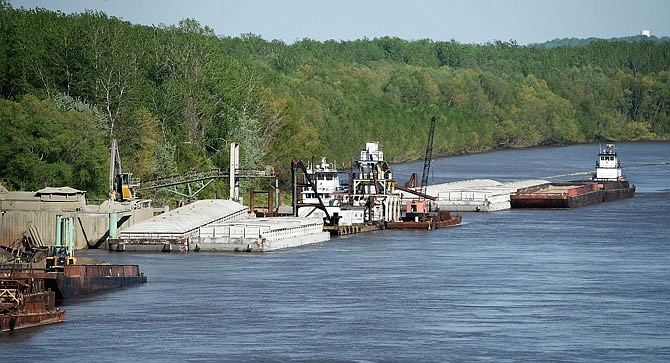Cargo - and potentially more than 4,000 jobs over 25 years - could be docking in Jefferson City if a port were built on the banks of the Missouri River near Jefferson City, according to a recent study.
Four partners in a project that could build a Missouri River port to one of two sites near Jefferson City are moving closer to formally applying for a port authority with the Missouri Department of Transportation.
An economic impact report completed in mid-June for the Jefferson City Area Chamber of Commerce, the Cole County Commission, the Callaway County Commission and Jefferson City says either proposal could create 4,385 jobs throughout the 25-year life of the port - or about 175 jobs per year.
The project gained momentum over the past year as the coalition hired Atlanta consultancy firm Cambridge Systematics to conduct an initial feasibility study to determine the cost and logistics of building a Missouri River port in the region. All parties later agreed to hire Cambridge to conduct a second economic impact report.
The report evaluated the economic impact to Cole, Callaway, Osage and Boone counties. If built, freight-dependent jobs like retail could benefit the most. The analysis estimated a Missouri River port could create 655 new jobs in retail. About 390 jobs could be created in the wholesale trade industry.
"The proposed port would support the continued expansion and growth of a number of strategic business sectors," the report states. "The proposed port would help to enhance the economic environment for traded and non-traded sector businesses in central Missouri by improving the cost of doing business in the region."
Regional leaders involved in the project identified two options for building a port.
The first would build a port on the Missouri River in southern Jefferson City, adjacent to the Missouri National Guard Ike Skelton Training Facility and near the chamber's industrial park.
A second option would build ports on the site in southern Jefferson City and on a site on the Missouri River in Callaway County near OCCI Inc.
Under the two-site plan, dry bulk commodities would be handled at the south site using conveyor systems. Commodities moved by crane, like those in shipping containers, would be handled at the north site.
Building only the south site would cost at least $54.77 million. The combined plan would cost $59.5 million.
Throughout the estimated 25-year life of the port, either plan could create 2,605 jobs directly, or about 104 jobs per year, according to the report. Another 1,780 jobs could be created indirectly from the port.
Operations and maintenance of either port could create 605 jobs directly during the 25-year life of the port, or about 24 jobs per year. The study estimated 735 jobs could be supported directly and indirectly by operations and maintenance of the port over its life.
Construction of south site facilities are expected to take about two years under both plans. In the dual-site plan, operations at the north site could begin about a year after construction starts.
Construction of the single-site plan could create 450 jobs directly. The study estimates an additional 170 jobs could be supported indirectly by construction of only the south site.
Construction of the dual-site plan could create 490 jobs directly and 115 jobs indirectly.
Cambridge estimates $28.4 million in state and local taxes would be generated by business conducted via the port after construction finishes. An additional $40.2 million in federal taxes could be generated once the port is complete.
"Some of the firms in Central Missouri may be relocating at the port to take advantage of the operational benefits provided by the new barge service and storage areas for containers and cargo," the report states.
Funding for the project as it moves forward remains unclear. Already Jefferson City, Cole County and Callaway County have agreed to contribute up to $47,600 each to fund the feasibility study and the economic analysis. The chamber agreed to contribute up to $27,000.
The groups plan to apply for several state and federal grants including federal BUILD grants, which allocate a maximum of $25 million to projects that support roads, bridges, ports or other infrastructure projects.
The chamber proposed Cole County pay $150,000, Jefferson City pay $150,000 and Callaway County pay $75,000 for remaining design work. Cole County commissioners are expected to vote next week on whether to participate in a joint port authority application to MoDOT between the entities.
Callaway County commissioners heard Friday from Randy Allen, Jefferson City Area Chamber of Commerce president, to discuss whether Callaway County will participate in a joint port authority. Allen said it's impossible to predict how much grant funding the project will receive.
"We'd like it to be zero-mortgage," Allen said. "The more grants we can get, the less mortgage we'll have."
The Jefferson City Council will consider Monday whether to participate in the port authority and whether to spend $150,000 in Sales Tax F funds to participate in the joint port authority.

